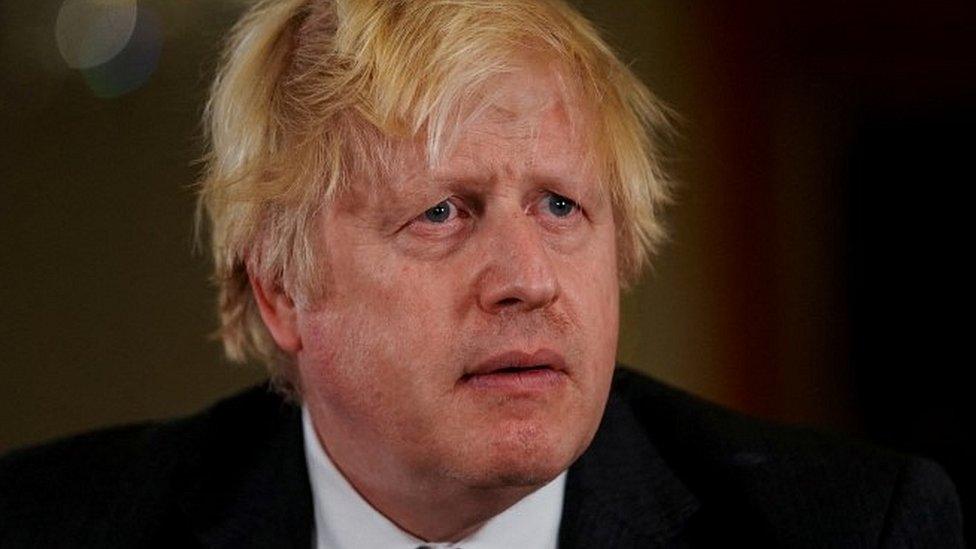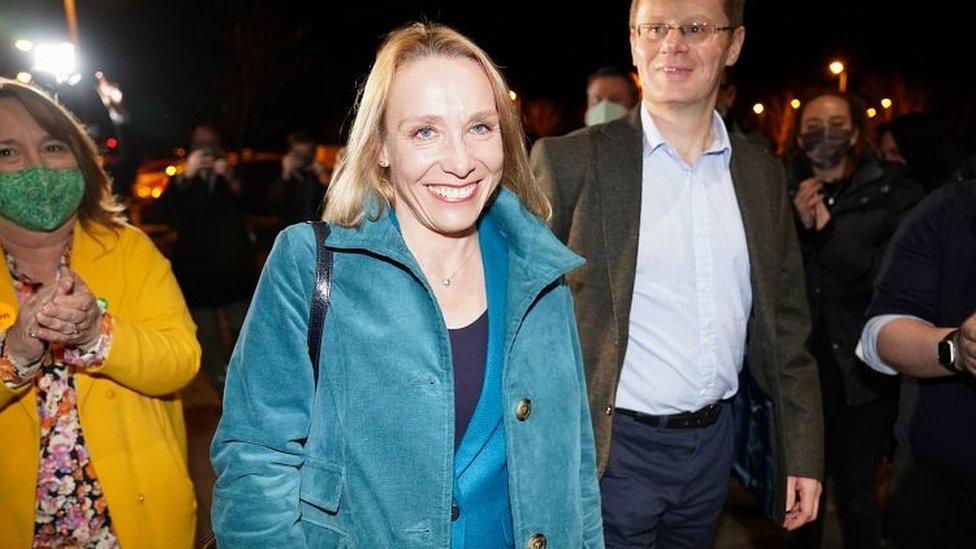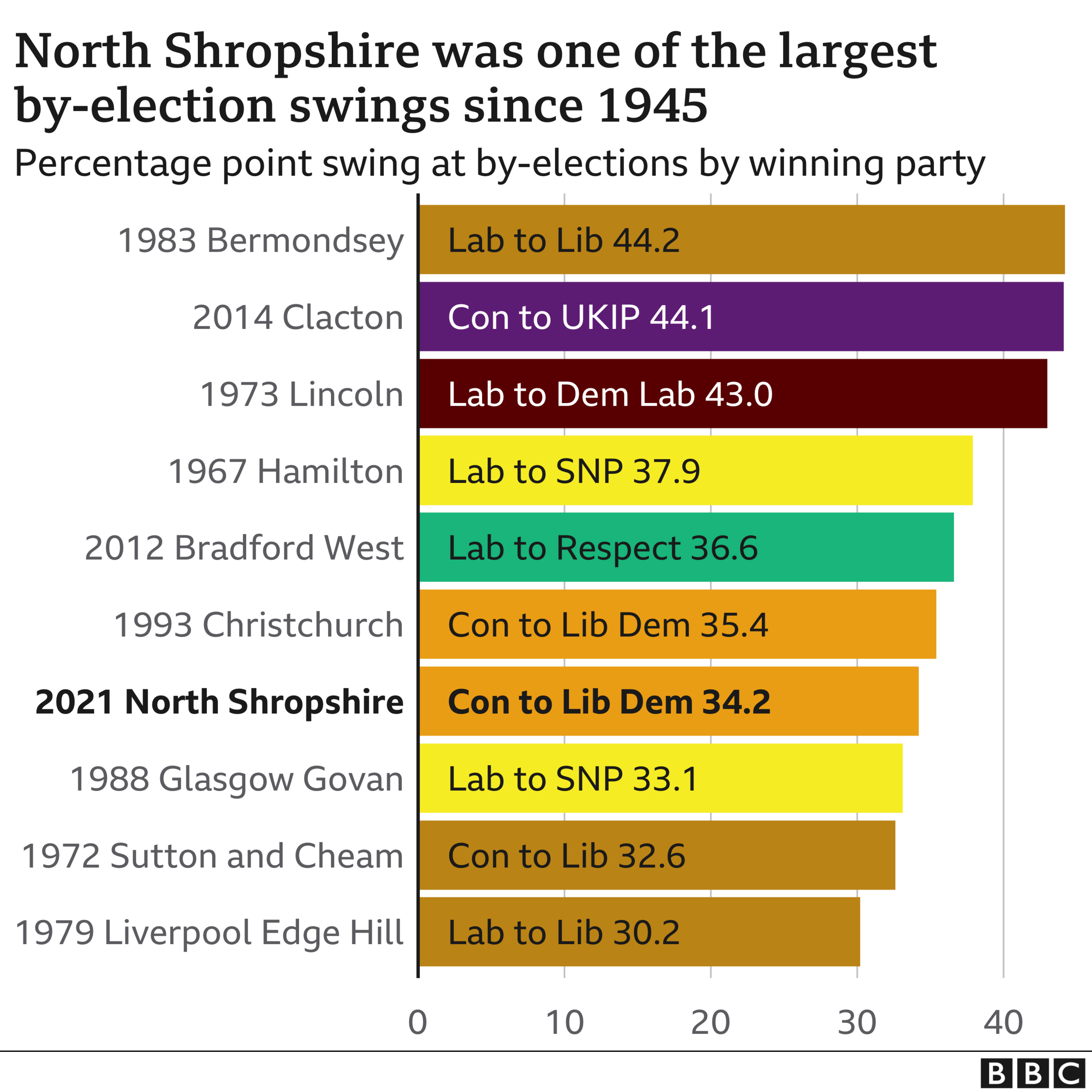North Shropshire by-election: Has Boris Johnson lost his winning touch?
- Published

How did the Conservatives lose one of their safest seats to the Liberal Democrats, in one of the biggest upsets in recent electoral history?
Questions over Christmas parties in Downing Street undoubtedly ignited the North Shropshire by-election campaign, but before that opposition parties had already picked up a sense of people in this safe, rural, Tory seat feeling undervalued and overlooked.
Both the Liberal Democrats and Labour pushed the idea of Conservative voters being taken for granted, pointing to "levelling-up" money going to formerly rock-solid Labour "red wall" areas in the Midlands and northern England, rather than North Shropshire.
The risk for the Conservatives is that same sense generated in this by-election is replicated in other Tory heartlands.
When Mr Johnson won a landslide in the 2019 general election, he ripped up the old electoral map and charged into Labour areas.
The challenge he has now is how to keep all those voters on side - finding an approach that speaks to newly won Tories in the Midlands and North without alienating traditional voters elsewhere.
It was only in May that the Tories swept Labour aside in a by-election in Hartlepool. In July there was talk of them winning in Batley and Spen, in West Yorkshire, before Labour managed a narrow hold.
The North Shropshire result without doubt demonstrates how quickly political fortunes can shift - and the recent turbulence in Westminster has played a significant part. There is frustration, and anger, at the government's direction.
But perhaps it demonstrates a change in mood that runs deeper, that could present a longer-term challenge for Mr Johnson's Conservative Party.

Labour denies suggestions of an anti-Tory pact with the Lib Dems, following Helen Morgan's win in North Shropshire
Its next electoral test will come in May, with local elections across England.
A bad set of results in Conservative heartlands would further wound Mr Johnson, and set nerves jangling about the next general election, which has to be held by May 2024.
There is already talk in some Tory circles about a leadership challenge next summer. A lot could happen before then and it may never amount to more than talk, but the party is famously unsentimental about ditching leaders that start to be seen as a liability at the polls.
It is dangerous to read too much into the North Shropshire result.
The Lib Dems threw everything at this campaign in an effort that would be hard to replicate across the country at a general election, but they have proven they can take on the Conservatives in parts of the country where support has been strongest.

Labour is also facing questions over whether it could - or should - have done better in North Shropshire.
Sir Keir Starmer's party has denied there was a pact to hang back and allow the Lib Dems a run at this seat, with the candidate Ben Wood insisting he put every effort into it and was backed by the national party.
But it does seem Sir Ed Davey's party was campaigning harder. The Lib Dem leader visited North Shropshire multiple times, while Sir Keir did not come once.
In 2019 Labour came second in North Shropshire, but now it has been pushed back to third.

Sir Keir Starmer did not visit North Shropshire during the by-election campaign
There will be those who argue it was the fact voters coalesced around the Lib Dems that landed a body blow on the Conservatives.
But it is a blow many would think Sir Keir would have liked to have claimed himself, to cement Labour as the main challenger to the Tories in the public eye and prove it can take them on and win.
There is always a danger in reading too much into a single by-election result, when such votes always take place in a very particular set of circumstances.
But if this does suggest the electoral map is still shifting, Labour has to find its way to win too.